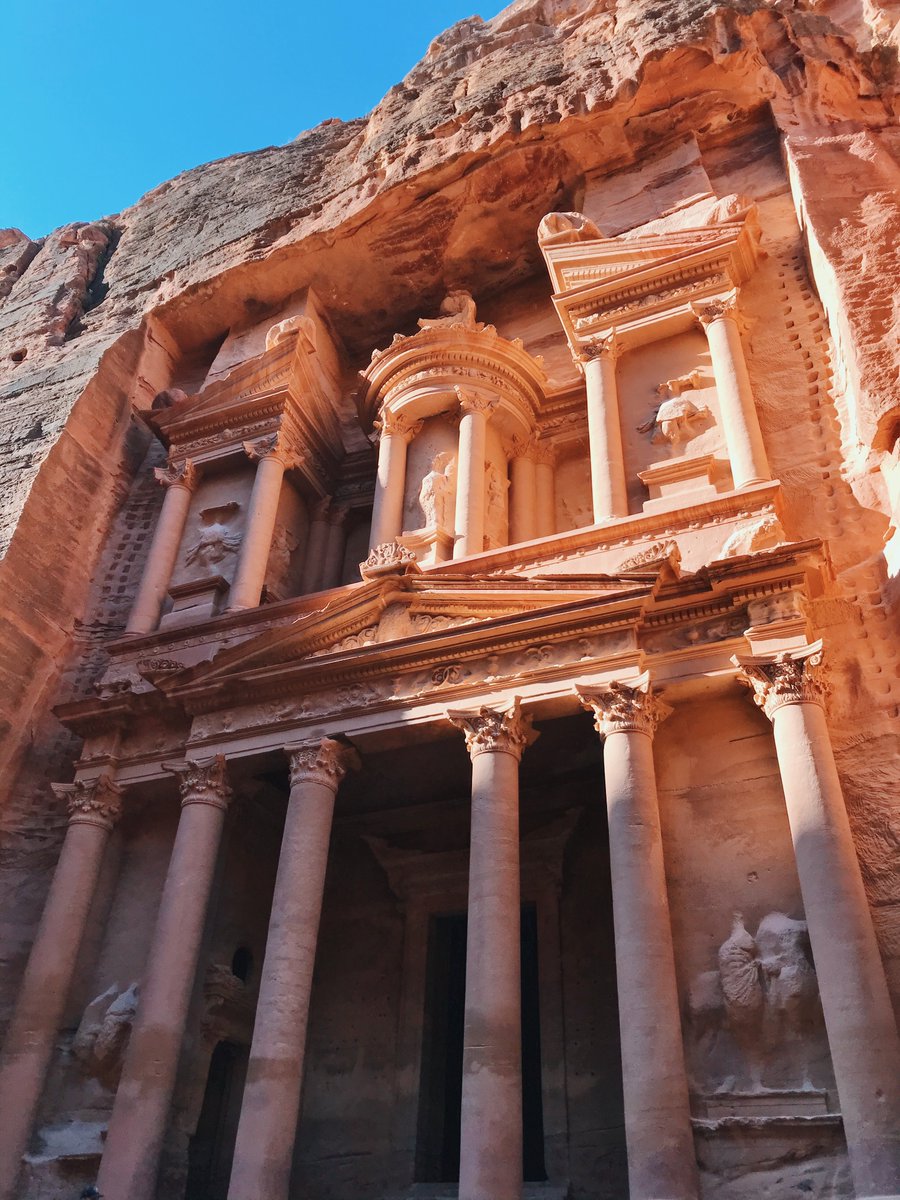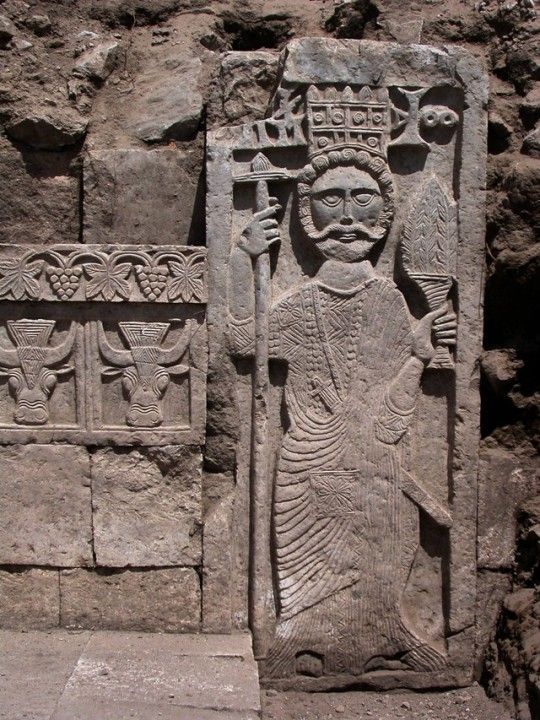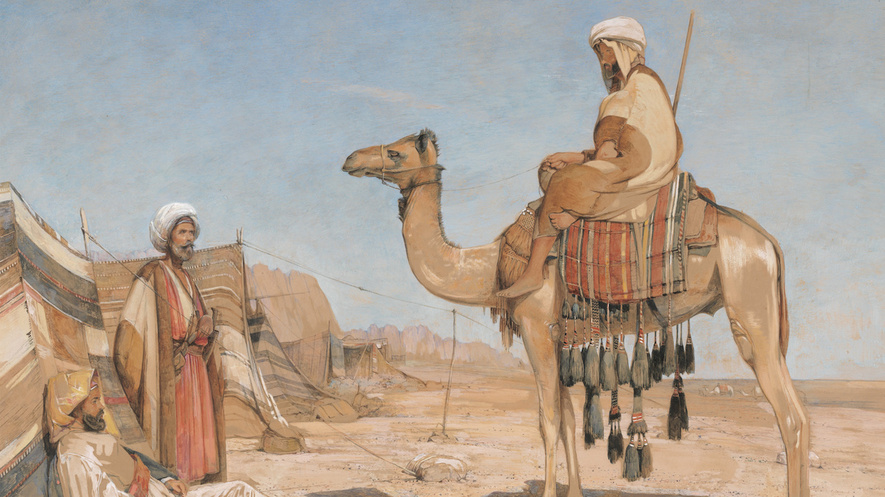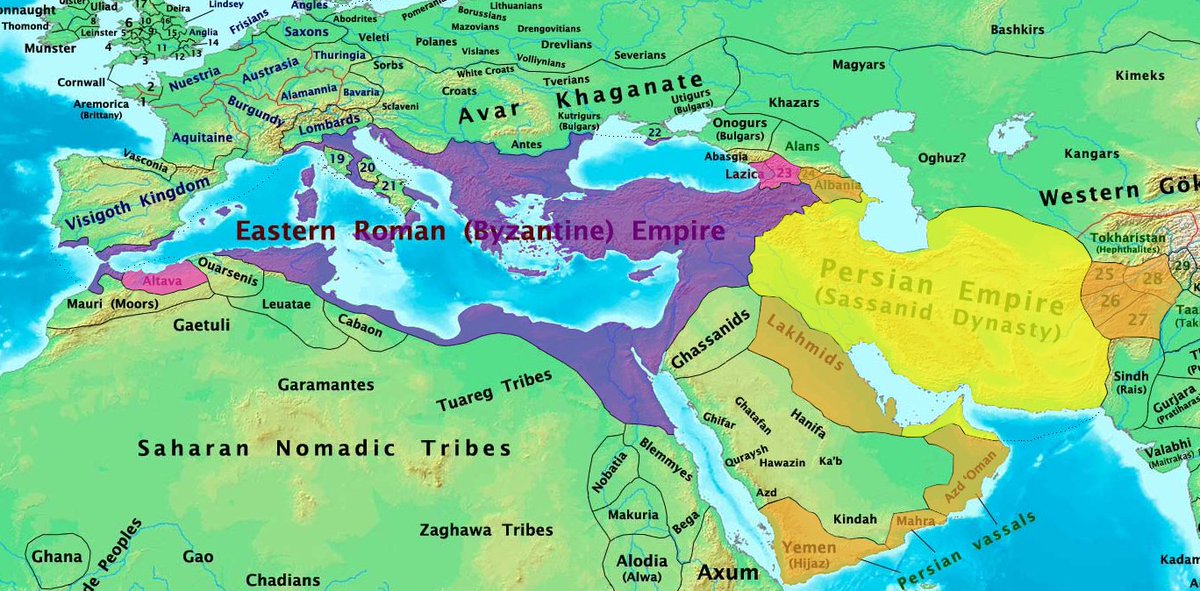Thread #4 Quatre: The Adventure of Arabs
Based off my notes of my favorite book of the year; just wanted to share my notes and a preview of a great read and 3000 years of a fascinating culture and civilization. https://www.amazon.com/Arabs-000-Year-History-Peoples-Empires/dp/0300180284/ref=tmm_hrd_swatch_0?_encoding=UTF8&qid=1607808443&sr=8-1
Based off my notes of my favorite book of the year; just wanted to share my notes and a preview of a great read and 3000 years of a fascinating culture and civilization. https://www.amazon.com/Arabs-000-Year-History-Peoples-Empires/dp/0300180284/ref=tmm_hrd_swatch_0?_encoding=UTF8&qid=1607808443&sr=8-1
Let's set the stage: In this map, you'll find our journeys & destinations. "Arabs" are an amalgamation of several groups of ppl who coalesced into one. Initially, they were the "other" by settled folk, but these tribal and nomadic "other" would soon define the settlers themselves
In 853 BCE, Assyrian King Shalmaneser III declares victory over a Levantine coalition aided by "Aribi." This is where the word and identity is first attested.
Tribal and savage nomads from the desert wastelands, their mentioning becomes more frequent among settled Mesopotamians.
Tribal and savage nomads from the desert wastelands, their mentioning becomes more frequent among settled Mesopotamians.
They are mentioned as having tribes and names based off animals:
Waki' (Strong Horse) was the progeny of Kalb (dog) son of Asad (Lion), etc
These "Aribi" were famed for their use of camels and the dimension they added in military conflict. Nuisances & mercenaries alike.
Waki' (Strong Horse) was the progeny of Kalb (dog) son of Asad (Lion), etc
These "Aribi" were famed for their use of camels and the dimension they added in military conflict. Nuisances & mercenaries alike.
The Etymology of "Arab" is contested but it seems for both the Assyrians & South Arabians (who did NOT consider themselves "Arab" early on) both refer to these "arabs" as desert-dwelling nomads, their defining feature; many times pejoratively.
These nomads would win in the end.
These nomads would win in the end.
The nomads loved their oral poetry and evolving language. Great seers (Kahins) would create mesmerizing poetry that even won the hearts of settled neighbors and foreigners. This oral catalog would coalesce into a "High Arabic" with time and practice. The basis of "Arab" identity.
An interesting parallel is the "Aryans" of India:
-Rig Vedic era featured mobile/half settled tribes warring with each other.
-Rishis sung/heard the great Vedas; this solely oral poetry became the roots of Indian thought & civilization
-Sanskrit being a "divine language"
-Rig Vedic era featured mobile/half settled tribes warring with each other.
-Rishis sung/heard the great Vedas; this solely oral poetry became the roots of Indian thought & civilization
-Sanskrit being a "divine language"
A few interesting groups (but not all) who eventually coalesced into Arabs:
-The Nabateans
-The South Arabians
-The Bedouins
-The Nabateans
-The South Arabians
-The Bedouins
Nabateans: The famed builders of Petra & extremely cosmopolitan folk who inhabited northern Arabia and the southern Levant. They incubated the precursor to Arabic script & later aided in formalizing Arabic. Influences from the Persians & Levantine would be pivotal in the future.
South Arabians – Non-Arabic speaking Sabaeans & Himyaris of Yemen were a settled civilization of Arabia. Their expertise in commerce/engineering would provide cities that gave many of the foundations and myths of Arab culture (al-Rahman=supreme god, Marib dam break myth...)
Bedouins: the classic image of Arabs finds a home in the nomads of the desert. Initially looked down upon by their settled cousins, it would be the Bedouin ways that won in the end with their Arabic dominating tongues, swords ruling cities, & their God’s message conquering minds.
A theme that dominates Tim's book & Arab history is the conflict between Hadr (settled life) & Badw (nomadic life).
The emphasis on Badw is an esp defining feature of Arab culture, both good & bad.
"Civilizations always collapse when Bedouins (Arabs) take over."
-Ibn Khaldun
The emphasis on Badw is an esp defining feature of Arab culture, both good & bad.
"Civilizations always collapse when Bedouins (Arabs) take over."
-Ibn Khaldun
The old history of Arabs is cloudy. It's a collection of poetry and myth. Much of which provides a backdrop for the Quran. But it is poetry that dominates Arab history.
"Poetry, as Adonis has written, is where the Arabic mind is free from ideology"
"Poetry, as Adonis has written, is where the Arabic mind is free from ideology"
A line of poetry is like a building: its basis is natural talent, its roof is the ability to transmit poetry from earlier poets, its pillars are knowledge, its door is practice, it’s inhabitant is meaning. A house that is uninhabited is no good.
-Ibn Rashiq
-Ibn Rashiq
Writing, while coming later did feature in early Arab history. The magnetic curve of Naskh script was preceded by much more crude carvings on desert rocks. See @Safaitic 's brilliant thread https://twitter.com/i/events/1048057113812115456
Kufic script is seen as a polygon parallel or prior to Naskh (the common Arabic script you see today) as a modified form of our Nabatean friends' old etchings. The cosmopolitan north would give imagery to the southern Bedouin voice.
Now as discussed earlier, the Arabs were disparate groups and tribes. Locked in a cycle of raiding and trading with each other. These are the prequel days of Islam and Arabiyyah.
Imru al-Qays would feature as a forerunner to the most famous of Arabs, Muhammed...
Imru al-Qays would feature as a forerunner to the most famous of Arabs, Muhammed...
As Imru rose to became a famed poet and fighter, coming oh so close to uniting the Arab tribes but failing once again oh so short in these old times of perpetual tribal warfare and disunity, known as the "Days of the Arabs."
Arabs thought this was their natural state.
Until...
Arabs thought this was their natural state.
Until...
You already know where I'm going with this, but a quick geopolitical background before we watch as the Arabs consolidate and explode out the peninsula
The Byzantines & Sassanids were finishing a brutal 20+ year war. Exhausted, they retired the services of the quasi-Arab Lakhmids and Ghassanids. The Ghas took it okay, the Lakh King rebuffed a marital alliance with the Persians. He was trampled to death with elephants by the Shah
The furious Lakhmids assembled a super raid of Arab tribes and decisively defeated the Persians at Dhu Qar. The first victory of Arabs vs Persians in a long time.
An obscure Meccan merchant apparently said that day, "Today the Arab have demanded vengeance from the Ajam and won."
An obscure Meccan merchant apparently said that day, "Today the Arab have demanded vengeance from the Ajam and won."
This merchant would not be obscure much longer.
Muhammed would finally bring that fabled unity to Arabs through the classic combo of religion + politics.
But Tim's book isn't about the history of Islam. While dedicating big chapters to Muhammed's era, it's not the focus.
Muhammed would finally bring that fabled unity to Arabs through the classic combo of religion + politics.
But Tim's book isn't about the history of Islam. While dedicating big chapters to Muhammed's era, it's not the focus.
The big takeaways of it:
-Islam has intrinsic/profound links to Arab(north & south) paganism & geography
-Spread of Arabic alphabet/literacy was integral to uniting culture and empire admin of Arab tribes
-Integration of Levantine+Persian motifs in theology & governance
-Islam has intrinsic/profound links to Arab(north & south) paganism & geography
-Spread of Arabic alphabet/literacy was integral to uniting culture and empire admin of Arab tribes
-Integration of Levantine+Persian motifs in theology & governance
The South Arabians (Sabaeans) are a particularly interesting contributor as they initially did not speak Arabic, looked down upon Bedouins as uncouth savages, & worshipped a supreme deity named al-Rahman (familiar?).

 Read on Twitter
Read on Twitter






 of Sheba(Saba)
of Sheba(Saba)



